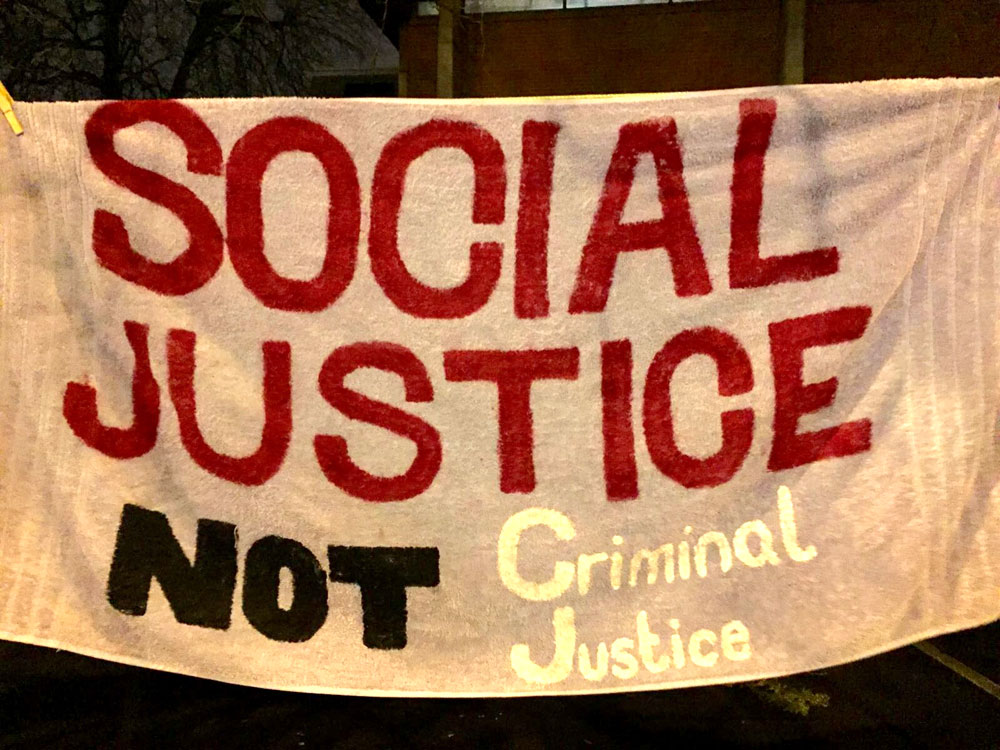
Members and supporters of the Revolutionary Communist Group joined Reclaim Holloway, Sisters Uncut, the Irish Republican Prisoners’ Support Group and others outside Holloway prison in north London on New Year’s Eve. A well-crafted visual display representing women and children carried messages and documented realities about women in prison. As each item was pegged on to the line protesters spoke about the realities of gender, race and class oppression behind women’s incarceration.
One comrade spoke about her long-term relationship with the prison:
‘In the mid-1980s I was briefly imprisoned in Holloway for not paying a fine from a demonstration organised by the City of London Anti-Apartheid Group outside the South African Embassy.
‘In the 1990s I used to go to the prison to visit a woman who had been convicted of a murder which she denied committing. While protesting her own innocence and trying to get an appeal, she spent her time helping other prisoners with legal cases, writing poetry and plays, painting, and getting involved with every creative or mind-stimulating thing the system could offer. Unfortunately, she is still inside today.
‘In the 2000s, I and my comrades from North London Revolutionary Communist Group demonstrated outside the prison alongside the late Pauline Campbell. Pauline’s daughter Sarah died in Styal prison in 2004, aged just 18, and from then up until her own death in 2009, Pauline dedicated all her time and all her energy to exposing the evils of women’s imprisonment. From lobbying the House of Lords to direct action, she did everything that could be done, and for those five years on every occasion on which a woman took her own life in prison, Pauline mounted a demonstration outside. She would go alone if she needed, but usually had a small group of supporters with her, from the RCG or the No More Prisons Group or others. Not that many though, as although reform groups and politicians were happy to speak to her, they weren’t keen on that side of her activities at all. Outside the prison, Pauline would stand in front of a sweatbox coming from court and demand it turn around and take the women inside to “a place of safety” and not into the hell-hole of prison. She would stay there until physically removed by the police. Pauline was an incredible fighter.’
Another comrade spoke about Oscar Wilde who was kept in Holloway until his removal to Reading gaol. Imprisoned for ‘sexual crimes’ Wilde’s detention symbolised the moralising power the ruling class exercise over those it considers to be a threat to social stability or ‘deviant’.
This year there were no women inside to respond to the annual demonstration of solidarity. Holloway, the largest women’s prison in Europe, was closed in the summer of 2016. The prisoners moved from Holloway have been relocated at prisons around the outskirts of London. Speakers on the demonstration showed a determination to fight for the future of the Holloway site. The current buildings will be demolished and the future of the ten acre site is now being decided.
The land belongs to the Estates Division of the Ministry of Justice and is therefore government land. But this site lies between the London boroughs of Camden and Islington; both have acute housing shortages and some of the highest private sector rents in the country. In both boroughs council housing is being transferred to the private sector at such a rate that social housing is disappearing.
When the closure was announced in 2015, then Islington Council executive member for housing and development James Murray said: ‘it is absolutely essential that any housing built on the site must include a decent level of affordable homes for local people’.
Since then there have been consultations with ‘strategic partners’, including the National Offender Management Service, Islington Council, NHS London, the Metropolitan Police, Condon Community Rehabilitation Company and women’s voluntary organisations, and a public meeting about the future of the land attended by Islington MP Jeremy Corbyn, Islington’s planning officer and representatives of the Reclaim Holloway campaign.
Suggestions from the local community and several women’s organisations include a woman’s centre, therapeutic centre and drug rehabilitation services centre. The RCG supports the aim that the Holloway prison site should provide social support for women but also demands that housing built on the site should be 100% social housing at truly affordable rents.
The 10-acre site is valued at £200m because investment bankers and property developers have pushed up the price of land in central London. Estate agent Glentree Properties describes it as ‘an up-and-coming area within a half hour commute to the city’. What this means is that developers view the site as a potential goldmine for luxury housing. The RCG is campaigning against this. We want to drive the property speculators out of London so that the Holloway land is used to provide homes for people not for profit!
The New Year’s Eve demonstration then marched off to Pentonville prison where we were joined by others, some of whom had arrived from another protest outside Brixton prison in South London. Prisoners shouted and waved back as we marched around the perimeter shouting greetings and slogans. Pentonville is well known for disgusting conditions and an inhumane level of overcrowding; but like Holloway, it sits on prime land which the government may well also want to sell off for yet more luxury development. The battle for housing rights and for prison rights must gain further support and continue in 2017.








